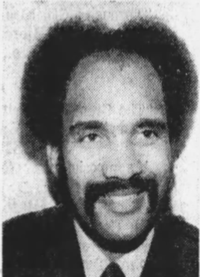 The Berkeley Gazette, Feb. 18, 1974
On March 6, 1980, a 21-year-old white woman known as Susan arrived in San Francisco, California, by train from Mountain View, California. Unemployed and between residences, Susan planned to stay with a friend of a friend while in town. That evening, she headed to the Upper Level discotheque club at the Embarcadero Center, stashing her suitcases under the club’s stairwell.
According to Susan, during her time at the club, she talked to and danced with a man who asked her to go home with him, but she refused. She said that after midnight, she was in a phone booth at the bar when the man grabbed her from behind, began beating her, and dragged her into the restroom. Susan alleged that he choked and beat her until she agreed to perform oral sex. She said the man then took a $10 bill from her wallet, replaced it with a $20 bill, thanked her, and left.
After the man and Susan left the restroom, Susan told a waitress that she had been assaulted, and the police were called. Susan gave an account to the responding officer and was taken to a nearby hospital emergency room. The doctor who examined her found hematomas on her neck and noted that she appeared anxious, uneasy, and excited. Susan told the doctor that her back hurt, and the doctor prescribed her valium.
During the investigation, Susan looked at photos of police officers from nearby Berkeley, and she identified 34-year-old Raymond Randle, Jr. as her attacker. At that time, Randle had been a patrolman with the Berkeley police department for seven years. A warrant was issued for Randle’s arrest on March 14, 1980, and Randle turned himself in.
Randle was charged with assault with intent to commit rape, assault by force likely to produce great bodily harm, and forcible oral copulation. He was released on his own recognizance. The Berkeley police department placed him on indefinite leave without pay pending the outcome of his trial.
In July 1980, Randle, who was black, was tried by an all-white jury before California Superior Court Judge S. Lee Vavuris. Assistant District Attorney William Fazio prosecuted the case, and defense attorney Jeffrey Gorelick represented Randle. Susan testified at the trial.
Randle testified that he met Susan in the Upper Level bar and that she later followed him to the restroom and asked for money to make a telephone call. When Randle refused, he said Susan suggested sexual favors in exchange for money. He testified that, at her suggestion, they had gone into the men’s restroom and engaged in oral sex in one of the stalls. Randle denied that there had been any choking or use of force. He testified that Susan had then asked for $6; he gave her a $20 bill and she returned a $10 bill. Randle testified that his friend – Berkeley police officer Tony Berry – and another man were present when he left the restroom. Berry testified that he had come into the restroom while Randle and Susan were in a stall, that he heard no sounds of a struggle, and that he saw the two leave the stall together.
The other man in the restroom was identified at trial as Michael Williams. Williams testified that he had witnessed a woman following a man into the restroom at the Upper Level and had been curious, so he also went in. He testified that he heard the man and woman whispering in the stall but did not hear any sounds of a struggle. Williams identified Susan in the courtroom but could not identify Randle.
On July 28, 1980, the jury returned a guilty verdict on the charge of forcible oral copulation but could not agree on the other two charges, and a mistrial was declared on those two counts. On September 17, 1980, Randle’s motion for a new trial was denied, and he was sentenced to three years in prison. Randle was freed on $35,000 bail awaiting the outcome of his appeal.
Following Randle’s conviction, the San Francisco Chronicle ran a story about his trial in which the newspaper failed to follow its policy of removing the names of victims of sexual assault. Upon seeing Susan’s full name in this article, an individual who knew Susan contacted the Berkeley police. In investigating this man’s claims, the police spoke with 20 individuals who said that Susan had a history of soliciting sex acts for money, had a reputation for dishonesty and theft, and had given accounts of the night of Randle’s alleged attack that contradicted her trial testimony.
On March 1, 1982, California’s First District Court of Appeals overturned Randle’s conviction on the basis of this new evidence, which the Court said significantly undermined Susan’s credibility to an extent that warranted a new trial. Randle’s appeal had also claimed that prosecutors had improperly used peremptory challenges to remove all prospective black jurors from the jury. However, the appellate court upheld the trial court’s finding that these jurors had not been eliminated due to group bias. The charges against Randle were dismissed on June 7, 1982.
Randle later filed a civil lawsuit against the city and county of San Francisco, Assistant District Attorney Fazio, and Police Inspector Martin Bastiani. He sought damages based on the alleged suppression of exculpatory evidence regarding other similar crimes Susan had previously reported. Information on the outcome of this lawsuit could not be found.
- Meghan Barrett Cousino |